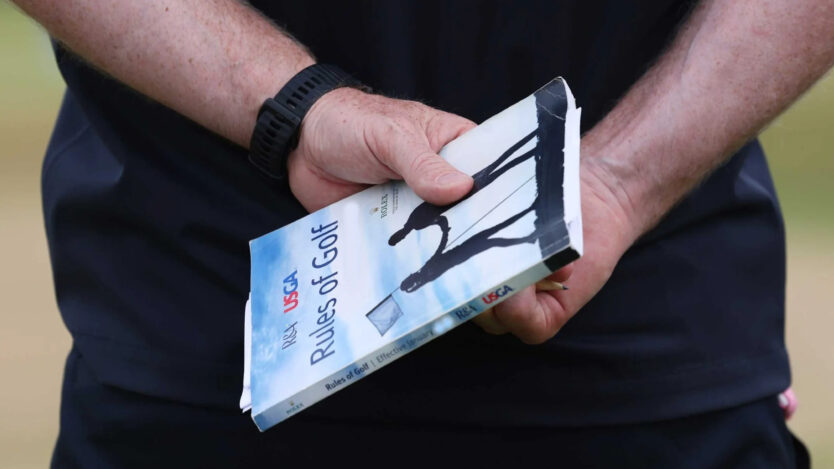When issues arise on the course, they need to be handled with tact and sensitivity. But there are rules and guidelines competition committees can follow to get to the right decision…
This article is part of GCMA Insights – topical content for golf industry professionals, discussing the things that matter to those who work in golf clubs.
Every season at our clubs, thousands of competition rounds take place without incident. Every now and then, though, a ‘situation’ will occur on the course and competition committees often have to try and sort it out.
Tempers can flare, especially if competitors feel their integrity has been questioned, but the Rules of Golf provides clear guidance – both for players and for committees – for resolving rules issues during and after a round.
Over the next few GCMA Insight editions, we’re going to go into some of these in detail – considering what you as golf club committees need to do when trying to unravel a scenario you almost certainly won’t have witnessed yourselves.
In the first, we’re going to look at parts of Rule 20, which is dedicated to dealing with rulings on issues under the rules. If your players aren’t aware of some of these, give them the details as soon as possible. It might just save you an administrative headache.
When there is a referee
If you’ve got a referee taking charge of one of your competitions, you have named them to decide questions of fact and apply the rules. They can seek advice from you before making a ruling, but whatever they decide must be followed by the player.
A player has no right to appeal to you about a referee’s ruling but the official can get a second opinion if there are other referees on the course, and they can refer a ruling to you for review. However, they are not required to do so.
A referee’s decision is final. If they’ve authorised a player to breach a rule in error, the player will not be penalised. But there are occasions where a wrong ruling – either by a referee or the committee – will be corrected.
When committees are making the rulings
Most of our competitions don’t have the benefit of a referee. If you’re the ones in charge, you’ll give the ruling and, again, your decision is final. If you cannot reach a verdict, you can ask the Rules of Golf Committee of The R&A to be the ultimate arbiters.
Get involved in the debate.
To join the GCMA, click here, or to organise a call with a member of the GCMA team, just complete the form below.
What happens when there is a wrong ruling?
This is when you, or a referee, have tried to apply the rules but have got it wrong. Rule 20.2d says examples include applying a rule that does not exist or failing to apply a penalty. If a ruling is later found to be wrong, you’ll need to correct if possible. But there are limits to this and, if it’s too late, the wrong ruling stands.
We’ve made an administrative mistake, what now?
Let’s say you’ve added up a handicap wrongly and the wrong player has won, or you’ve miscalculated a tie in stroke play, these kinds of errors are known as administrative mistakes and there is no time limit in fixing them. It is not the same as a wrong ruling and even if a result is final, or a competition has closed, you’re going to need to correct the mistake and amend the results of the competition if needed.
WHY JOIN THE GCMA?
Membership of the GCMA unlocks a network of like-minded professionals, provides you with support in your professional and personal development, and provides you with a multitude of benefits. Whether that’s the tools that will help you to excel in your profession, or a wide range of services to support your wellbeing, signing up to the GCMA is joining a community.
Should we disqualify someone if the result of a match or competition is final?
This depends on whether the format is match play or stroke play. If it’s the former, then there is no time limit on disqualifying a player for matters of serious misconduct, deliberately failing to apply a penalty, or agreeing with another player to ignore a rule or a penalty that they know applies.
This can be done even after the result of the match is final.
Penalties can’t usually be added after the fact when a stroke-play competition has closed but a player “must be disqualified”, even if that’s the case, if they’ve:
- Returned a score for any hole lower than actually taken (unless it’s because they failed to add penalty strokes for an infringement they were unaware about)
- Knew they were breaching a rule which has a penalty of disqualification
- Agreed with a player to ignore a rule or penalty that they know applies
- Committed an act of serious misconduct
Next time, we’ll look at how to resolve questions of fact when making a ruling as a committee.
This article is part of GCMA Insights – topical content for golf industry professionals, discussing the things that matter to those who work in golf clubs.
Get involved in the debate. To join the GCMA, click here, or to organise a call with a member of the GCMA team, just complete this form and we’ll be in touch!
Enquiries
"*" indicates required fields



